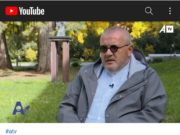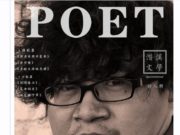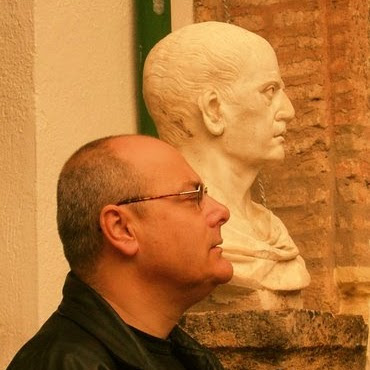SANTIAGO AGUADED LANDERO (Lepe, Huelva, Spain, 1962) Degree in Biology from the University of Seville (1988) and PhD from the UPM, Madrid (1992). He is living in Huelva since 1996 where he teaches at the University of Huelva, Science Education & Enviromental Education. He has published over twenty books of poetry among which are: « Apocryphal Journal of an Alchemist » (2005). Bejar. LF Editions; « The book of beggars ». (2007). Baile del Sol, editores; «The book of perfumes » (2008), Editorial Islavaria. «The Agency of Fear» (2009), Ayto de Punta Umbria. (2009). « Salarium » (Diputación Provincial de Granada, « Defeated Voices » (Ayto Valdepeñas, 2009). In 2012 it has published two anthologies: «The Alchemy of water” and « Dissolution » a tour of his poetry over ten years. In 2013 he published «Alchemy of Earth». In 2014 he published the anthology « Alchemy of Fire » and is working on the « Alchemy of Salt » to close this tetralogy.
PERFUME OF ZALEMA[1]
(OR OF A SEXUAL SYNAESTHESIA)
Should one write about the beautiful woman that displays her natural haughtiness among men? She just leaves a feeling of libidinous meanness. Let us talk about the glasses that are thirsty for wine. Does one need to be drenched in alcohol so that flowers can reflect the radiant light of some magic eyes? All empty glasses wish to be refilled; even if it is only with water or zalemas. Filled, the glass gives off its aromatic aldehyde and stabs the tongue as a salt crystal. The colour of drinking is violet or yellow, depending on the winery or on the tongue. And if drinking is blue and stopping is jet black, we must cross the stairs and reconsider every escape as a return. This is what we know: the manure feeds the vine that will produce grapes and the grapes contain the yeast that will produce the alcohol and this will become a veil of flor[2]. Aromatic, the wine is a perfume that gives up on sight to savour.
© Published in “Cuentos alígeros” , VV. AA. (III Algazara de Microrrelatos Award). Publisher Hipálage, 2010.
ALICE IN THE MAZE OF TRUTH[3]
Literature is the art of lying the truth properly.
In vino veritas.
IS reality real, Alice?
Is the smile of the Cheshire Cat or that of the black and wicked cat with the untangled ball true? Is it true that you are the reincarnation of Altisidora[4]? The only truth, if there is any, is the change (the everything flows from Heraclito) or the matter (=energy). That is why the truth is never true. It is (not) necessary to work so that the lie becomes truth. And once it has been reached, you will turn it inside out to turn it into a lie. Is this an illness, Alice? Is the truth a virus, a poison of the blood? Is it? Is the truth silence? No, it is not.
If everything I had ever written was true, I would erase it immediately with the rubber of Oblivion. Not because of hypochondria, but because of professional sense (as a poet as well as a scientist). If the truth turns into lie, then the illness is also health and the truth serum is an ailment as addictive as alcoholism. The truly truth lies in the wine: gift of inebriation. The truly truth is always yet to be invented. After all (or nothing at all) the truth is a thistledown held/rocked by the air, by the winter wind.
(Unpublished)
THE SALOME OF L. CRANACH
WORDS can’t save us.
But they help us survive and they survive us: in other mouths. To the bark of the Absence, the howl of the Shadow. To the silence of the Shadow, the yell of the Image. And so forth we continue committing the same crimes, making the same mistakes with no memory. What were the Image, the hand on the stone, the hand on the canvas made for, then? If everyone understood that the act is an intention still invisible, if we understood that there is not end but cycles, if we understood it, we could leave the silver trays, stop being enemies and try to become innocents.
From “El libro de Salomé”. Ed. A.C. Al-Bakri, Huelva: 2014
[1] Variety of grape typical of a region called Condado de Huelva, Spain.
[2] Wines are commonly aged through the system of bajo velo de flor. This system allows a “veil” of flor yeasts to form on the surface of the must in the casks.
[3] Truth serum is a psychoactive medication used to obtain information from a person. The drug contains sedatives, hypnotics and other barbiturates as sodium pentothal (image above). Its efficacy was never proven.
[4] Reference to a character of Don Quixote by Cervantes that can be considered as the first Lolita in the history of literature, prior to that of V. Nabokov.
PERFUME DE ZALEMA[1]
(O DE UNA SINESTEXIA SEXUAL)
¿Se debe escribir de la mujer bella que pasea entre los hombres su natural altivez? No deja más que sensación de ruindad libidinosa. Hablemos de los vasos que tienen sed de vino. Acaso haya que empaparse en alcohol para que las flores reflejen la radiante luz de unos ojos mágicos. Todos los vasos vacíos quieren que los rellenen, aunque sea sólo con agua o zalemas. Lleno, el vaso desprende su aromático aldehído y punza en la lengua como un cristal de sal. El color de beber es violeta o amarillo dependiendo del lagar o de la lengua. Y si beber es de color azul y dejar de hacerlo es azabache, atravesemos las escaleras y reconsideremos toda fuga como regreso. Esto sabemos: el estiércol alimenta a la cepa que producirá uva y la uva lleva la levadura que producirá el alcohol, éste se convertirá en velo de flor. Aromático, el vino es perfume que renuncia a los párpados por el paladar.
© Publicado en “Cuentos alígeros” , VV. AA. (III Premio Algazara de Microrrelatos). Editorial Hipálage, 2010.
ALICIA EN EL LABERINTO DE LA VERDAD[2]
La literatura es el arte de mentir bien la verdad.
In vino veritas.
¿ES real la realidad, Alicia?
¿Es verdad la sonrisa de gato de Cheshire o la del gatito negro y malo del ovillo desenredado? ¿Es verdad que eres la reencarnación de Altisidora[3]? La única verdad, si es que hay verdad, es el cambio (el todo fluye de Heráclito) o la materia (=energía). Por eso la verdad nunca es verdad. (No) hay que trabajar para que la mentira se convierta en verdad. Y una vez alcanzada volverás del revés para mudarla en mentira. ¿Es esto una enfermedad, Alicia? ¿Es la verdad un virus un veneno de la sangre? ¿Sí? ¿Es la verdad un silencio? No.
Si todo lo que hubiese escrito fuese verdad, enseguida lo borraría con la goma del Olvido. No por hipocondría sino por sentido profesional (tanto de poeta como de científico). Si la verdad se vuelve mentira, entonces la enfermedad también es salud y el suero de la verdad es una dolencia tan adictiva como el alcoholismo. La verdadera verdad está en el vino: don de ebriedad. La verdadera verdad está siempre por inventar. Después de todo (o de nada) la verdad es un vilano sostenido/mecido en/por el aire por el viento del invierno.
http://upload.wikimedia.org/wikipedia/commons/thumb/c/c6/Sodium_thiopental.svg/247px-Sodium_thiopental.svg.png
14-XII-2014
(Unpublishied)
LA SALOMÉ DE L. CRANACH
Para B. Callejón
LA PALABRA no nos salva.
Pero ayuda a sobrevivir y nos sobrevive: en otras bocas. Al ladrido de la Ausencia el gemido de la Sombra. Al silencio de la Sombra el aullido de la Imagen. Y así vamos cometiendo los mismos crímenes, los mismos errores sin memoria. ¿Para qué se hizo, entonces, la Imagen, la mano en la piedra, la mano en el lienzo? Si todos entendiéramos que el acto es intención aún invisible, si comprendiéramos que no hay final sino ciclos, si lo entendiéramos, podríamos dejar las bandejas de plata, dejar de ser enemigos e intentar ser inocentes.
21-XII-2012
De “El libro de Salomé”. Ed. A.C. Al-Bakri Huelva: 2014
[1] Variedad de uva característica del Condado de Huelva.Spain
[2] La droga de la verdad (o suero de la verdad) es una medicación psicoactiva utilizada para obtener información de una persona que está indispuesta o imposibilitada para facilitarla. La droga contiene sedantes e hipnóticos que alteran la alta función cognitiva incluyen la escopolamina, el temazepam y otros barbitúricos como el pentotal sódico (en la figura). Nunca se probó su efectividad.
[3] Referencia a un personaje del Quijote de Cervantes que puede ser considerada como la primera Lolita de la historia de la literatura, mucho antes de de V. Nabokov.


















